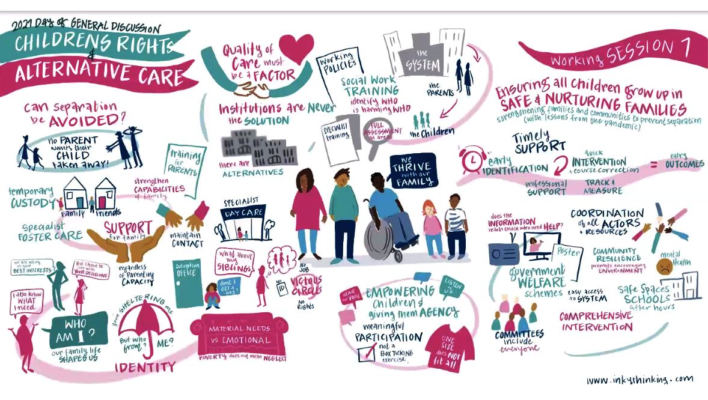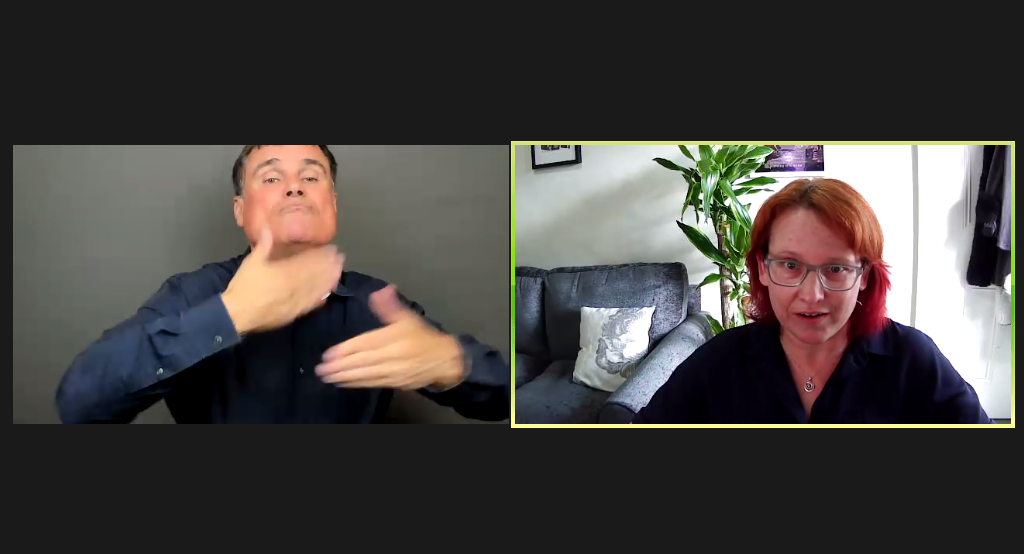Child ‘protection’ without participation just doesn’t work

16 September 2021 – Following preparations with ATD Fourth World, the United Nations Committee on the Rights of the Child invited Kaydence Drayak, Tiegan Boyens, and Gill Main to speak during their annual Day of General Discussion on the theme of children’s rights and the “alternative care” provided when children are separated from their families. Kaydence’s remarks are here, Tiegan speaks in this video, and Gill Main’s are below.
Thank you so much for the invitation to speak today. My name is Gill Main, and I’m an Associate Professor at the University of Leeds. My research is on child poverty, social exclusion, and children’s participation. I have been so impressed by the profound, nuanced, and passionate insights that children, young people and parents have shared in putting together the ATD Fourth World submissions – including what Kaydence has presented today.
A sign-language interpreter and Dr. Gill Main
We ask a lot of the young people who have bravely shared their experiences, and I feel like I owe you the respect of sharing that I also experienced child protection interventions while growing up – so I understand the courage it takes to do this, and I have so much respect for what you are doing today.
Tick-box exercises and tokenism
I am going to start with an underlying principle that I believe must be at the centre of alternative care – participation. I mean the meaningful and in-depth participation of children, young people, and parents in all aspects of alternative care. Children’s right to have a say – not only in their own lives but in relation to policies which shape the conditions they live in – are written into the Convention on the Rights of the Child.
But for the young people we spoke to, this is in practice a tick-box exercise which is tokenistic and often harmful. One young person described their ‘participation’ involving sitting in a room full of adults being made to justify things those adults perceived them to have done wrong. That is not what basic respect – never mind meaningful participation – looks like.
I’m going to talk about the importance of relationships in children’s lives; the perverse ways that social work interventions and alternative care are resourced in the UK; and about how we might go about redesigning systems with children’s participation at the centre.
Brothers and sisters at the core of identity
Relationships are vital to all of us – including children. Decisions around alternative care tend to focus on parent-child relationships. But children also have relationships with siblings, wider family, peers, teachers, and so on. Sibling relationships were raised again and again by young people in our consultation – as Kaydence mentioned. They are at the core of young people’s identities – especially if they can’t live with their parents.
Yet alternative care placements often place siblings separately, remove some siblings but not others, and move children away from friends, peer groups, and family networks. This does untold damage both in the present and for children’s future lives and well-being. We often focus on the long-term damage – but children are also important as people, here and now.
Few of us would tolerate being torn from everyone we know, being told we can’t see certain people, and being denied information about ourselves – why on earth do we think this is acceptable for children?
A key action here is that child protection interventions should be redesigned with an equal emphasis on all the relationships which children themselves identify as important.
Families separated because of poverty
On resourcing, a huge force in the UK shaping which families are separated is poverty. Our government has systematically slashed the financial support available to families, resulting in families being unable to provide adequately for themselves, and in unendurable stress created by managing inadequate budgets. Families are then punished by being told that they are neglecting children – when in reality they are doing their best in an impossible situation.
The ideal solution would be that the government ensures all families have what they need to survive – but given recent cuts to Universal Credit, the government’s failure to ban unregulated accommodation for children aged 16-17, and lower rates of pay and benefits for young adults, including young parents, this seems a long way off. So while we work towards that, we need to make sure that social workers are trained to be ‘poverty aware’.
One example of what this looks like is in Leeds City Council, where social workers can now indicate that poverty, rather than abuse or neglect, is the cause of a child protection concern. It also looks like embedding the expertise of children, young people and parents in all social worker training, so that social workers can better differentiate between the harms that might be done by parents, and the harms being done to parents and children by the state.
Experts by experience
We serve no-one by removing children from loving parents – who may be experiencing poverty, mental health issues, or other difficulties – and paying foster carers to provide temporary care for them. Simply redirecting that money to providing adequate incomes and high quality support and health care would produce better outcomes for everyone.
Children, young people, and parents who have lived it are the most important experts in the alternative care system. As Kaydence said, we are onlookers – children, young people and parents don’t get to stop thinking about these issues when they go home for the night. Yet children’s expertise and preferences are so often ignored.
The children and young people we spoke to said that adults tell them that this is to protect them – yet every single care experienced young person we spoke to had damaging experiences in care, ranging from bullying and exclusion to abuse.
Protection cannot be achieved without participation – it doesn’t work.
Start by talking to children and families
The ways that child participation is built into the current system in the UK is a one-size-fits-all box ticking exercise. This is often infuriating and damaging to children – to their trust in those who profess to care, to their self-esteem, and to their identity as an individual with rights who is worthy of respect. We need to completely overhaul these systems, starting by talking to children and families – for a long time, and with a mentality of restoring the harms that the system has done to them.
Then we will be able to co-create systems in which meaningful participation is possible. What that looks like is not predictable and must never become static or a blanket policy. ATD Fourth World and related work I have done with children and young people in poverty have the tools we need for this process – and we’re ready to go as soon as we have the resources and the commitment from policy makers and practitioners that this input will be respected and used.
Thanks to the End Child Poverty Coalition for supporting our preparations for this event.


